- Home
- Jacqueline Wilson
Sapphire Battersea Page 3
Sapphire Battersea Read online
Page 3
Dear Nurse Winnie! She was the only person in the whole hospital I cared for now, apart from Eliza, my little sister. Eliza was brought to my old foster home in the country when she was a babe. I was sent off to the hospital before I turned six – and five years later Eliza followed me.
I had greeted my little foster sister joyfully, desperate for news of home. It was a hard blow when she spoke of our brother Jem so fondly. I had adored Jem passionately when I was a tiny girl. He had cared for me tenderly and played with me patiently. He had even taught me to read and write … He had been like a mother and father to me as well as a foster brother. I’d hoped that one day, far in the future, he’d be my dear husband too. When I played dressing up as a bride, Jem had kissed my finger and promised that he’d put a ring on it one day.
I had believed him utterly. I had thought of him as my Jem, but when little Eliza chatted away innocently enough, I realized that he was her Jem too. He had played all the same games with her. I could not bear it. I felt he had betrayed me. I stopped writing loving little messages to him in my weekly letters home. There seemed little point in writing anyway, as he never bothered to reply. Though perhaps he had written? Miss Smith had actually admitted that many of our letters were confiscated.
Tears sprang to my eyes when I thought of Matron Pigface’s trotter-fingers fumbling with my precious letters, tearing them to shreds and tossing them into the fire. I wondered what Jem would have written …
No, what did I care? I had been a silly little child and he had been a kindly lad, that was all. It was ridiculous to believe that our love had been real. I would not be wearing my green ribbon for Jem, or for any other young lad, come to that. I did not want foolish followers. I only cared for Mama.
I WOKE VERY early and sat up in my narrow bed. I looked down the long dormitory of sleeping girls in the silvery dawn light. This was the very last time I would ever see them!
I clasped my hands around my knees, hugging myself. It was not unduly cold but I shivered in my nightgown. Today I was leaving the hospital for ever. Hetty Feather was no more. I would leave her behind, along with my brown gown and apron and cuffs and stupid great floppy bonnet.
I peeped down at the basket at the end of my bed. My new clothes were neatly folded, waiting for me. I felt a thrill of excitement at the thought of putting them on, though they were ordinary work clothes – a plain grey dress and coarse cream apron. I knew nothing of fashion after all my years of incarceration in the hospital, but I could always dream of a real silk dress to match my green ribbon, long frilled skirts, fine lace, white silk stockings, and shoes as elegant as Cinderella’s glass slippers. I had no new shoes at all – my hideous brown clumpers still fitted me, so they were deemed suitable for my new position.
I was going as an under-housemaid to a gentleman who lived in the suburbs of London.
‘Not just any gentleman, Hetty,’ Miss Smith had told me excitedly. ‘He’s a writer! Mr Charles Buchanan.’
‘Do you know him, Miss Smith?’
‘I know of him, dear. He writes children’s stories for the Religious Tract, as I do. Very moral tales. He is apparently a very moral man. He applied to the hospital because he thought it an act of charity to take a foundling child into his employ – and I did my best to persuade the Board of Governors that you would be an ideal candidate, Hetty. It was a hard task. Matron Bottomly seems to feel that you are quite unsuited to such a worthy gentleman’s establishment, but I argued your case, stressing that Mr Buchanan might be a very good influence on you. Why are you staring at me like that? Surely you’re pleased?’
‘I’m pleased you stood up for me, Miss Smith, of course I am, but if I’m completely truthful I do not really want to be this very moral gentleman’s servant,’ I said.
‘Well, whose servant do you wish to be?’ said Miss Smith, looking aggrieved.
‘I don’t want to be anyone’s servant,’ I said, folding my arms obstinately.
Miss Smith sighed. ‘So how do you propose to earn your living, Hetty?’ she asked tartly.
I swallowed hard. Wasn’t it obvious? I clung to my own elbows to give me strength to come out with it. ‘I – I hoped my memoirs would be published, and I would earn money that way,’ I said.
‘Oh good Lord, Hetty, how could you possibly think such a thing!’
‘Well, you said as much – in a roundabout fashion. You said I had a vivid turn of phrase and excellent powers of description, and a powerful imagination.’
‘That’s all too true.’
‘Well?’
‘But that doesn’t mean that your memoirs are fit for publication!’
‘But why have you praised them so?’
‘I wanted to encourage you, my dear. I never dreamed you thought you could publish such a work!’
‘I know it’s a little childish in parts because I wrote most of it years ago – but I can polish it a lot, maybe rewrite sections. Oh, Miss Smith, surely it stands some chance of publication?’
‘It’s a wonderful piece of work, Hetty, but only as a private journal. It is not fit for publication. Be reasonable! Only recollect the things you’ve written about Matron Peters and Matron Bottomly!’
‘But they’re true, every last word – I swear it!’
‘I dare say, but there would be the most terrible scandal if such a fiercely condemnatory document about such a well-respected charity were published!’
‘Well, surely a scandal would be good. It might sell more copies!’
‘Hetty, you’re incorrigible! You can never publish your memoirs – they’re much too bold, too personal, too passionate, too violent, too bitter, too unladylike, too ungrateful, too every single thing!’
‘Then why didn’t you tell me this years ago?’
‘Because I felt it was very good for you to have a private outlet for your pent-up feelings. I know how hard it’s been at the hospital. It’s been exceptionally good for you to develop a writing discipline. You have remarkable literary skills, far beyond your age and station, but you must channel them carefully if you ever hope to write for publication. Oh, please don’t upset yourself so, dear!’
I had started crying bitterly, utterly cast down. I had so believed my memoirs would be published and make my fortune so that Mama and I could live together without serving a soul.
Miss Smith lent me her lacy handkerchief. When I continued to cry, she put her arm round me and mopped my face herself. Her kindness softened me, and I tried hard to stop sobbing.
‘There now, perhaps you really will be a writer some time in the future. But not yet a while, my dear. You can accept this perfect position with Mr Buchanan and be patient. I am sure you will observe good writerly habits if you work in his establishment.’
‘I’d sooner work for you, Miss Smith,’ I said.
‘If you were my servant, I’d expect you to go “Yes, missus,” and nod obediently every time I spoke to you,’ said Miss Smith.
‘Yes, missus,’ I said, bobbing her a curtsy – and she burst out laughing.
‘I scarcely recognize this new persona, Hetty! Carry on in a similar vein at Mr Buchanan’s like a good sensible girl. You really must try to act humbly and do as you’re told. I’m starting to feel a little worried about Mr Buchanan. There he is, thinking he’s taken on a meek little foundling girl who will be very grateful for her good position. You are a little grateful, aren’t you, Hetty?’
‘Yes, Miss Smith,’ I said, because I supposed I was grateful to her. I did not see why I should be grateful to anyone else. Even after nine years’ hard training at the hospital, I still did not see why I had to be content to be a servant.
Every Sunday in the chapel we sang:
‘The rich man in his castle
The poor man at his gate,
God made them, high or lowly,
And ordered their estate.’
Why did I have to be stuck being lowly? Why couldn’t Mama and I be rich women in our castle?
‘You wait, dearest
Mama,’ I whispered as I sat in bed my last morning. ‘I will earn our fortune with my writing one day, no matter what Miss Smith says. Then we will have our castle. Well, maybe not a castle exactly, but a grand villa with our own pretty bedrooms, where we will live very happily and harmoniously together, just the two of us. We will be rich enough to have a whole troop of servants, but we won’t employ a single one. We will not want any poor girls working for us. We will look after ourselves splendidly. I will clean for you, Mama, and you will cook for me, and we will be private and cosy and comfortable.’
I slid out of bed and walked down the long dormitory, past all the sleeping girls. I tiptoed out onto the landing, and then down the long wooden staircase, the grand portraits staring at me sternly.
‘Frown all you like. I’m not afraid of you. I shall never have to stare up at you ever again,’ I declared.
I crept right downstairs, across the girls’ dining room, the table already set for our meagre breakfast. There was no clattering from the kitchen. The cook must still be sleeping. I moved as silently as a shadow through the great room, which still reeked of yesterday’s mutton, and proceeded along the servants’ corridor.
I halted outside Mama’s room. I could not go in. There was another maid living there now, a large, clumsy girl called Maud. She was harmless enough, but I hated her simply because she had taken Mama’s place. I could not stand the thought of her gimcrack possessions littering Mama’s chest, her dirty brush and comb on Mama’s washstand, her fat, ungainly body sprawled all over Mama’s bed.
I stood outside the door, leaning my head against the varnished wood, remembering all the precious times I had spent with Mama within those four walls.
I wrote on the door with my finger: I love you, Mama, and then crept away. I returned to my bed undetected. If only I had been so lucky before! We would have had some chance of regular meetings if Mama were still employed at the hospital in London and I were not too far away in the suburbs. A simple bus ride, perhaps.
My heart started beating faster at the thought of my journey today. I had Mr Charles Buchanan’s address written inside my journal: 8 Lady’s Ride, Kingtown. I had no idea how I would reach this destination. I had only been outside the hospital grounds once, when I was ten – the day of Queen Victoria’s Golden Jubilee. We had been escorted all the way to the great children’s celebration in Hyde Park. I had seen the circus there, and had run away to try to find my childhood idol, Madame Adeline, the magical spangled woman who had let me sit on one of her rosin-backed horses and had won my heart for ever. I had taken an omnibus ride that day, as bold as brass. I tried hard to remember how I had hailed it and how much money I had paid. What happened when you wanted to get off? Did you ring some kind of bell? How would I know where 8 Lady’s Ride was? How would I know anything at all in the outside world?
I remembered how the children in Hyde Park had pointed and jeered at me. Would people still point me out and ridicule me? I clenched my fists. I would make them sorry if they did. I was Sapphire Battersea, and I would show everyone. I was not content to be a common servant. One day my name would be famous, recognized all over London.
I shut my eyes and saw Sapphire Battersea in big fancy lettering on advertising posters, Sapphire Battersea in bold print in newspapers. I heard the name Sapphire Battersea shouted through loudhailers, Sapphire Battersea acclaimed by thousands of mouths.
Then a handbell clanged along the corridor – and I was Hetty Feather again, back in my dismal dormitory. All the girls groaned and yawned and struggled out of their beds, hopping from one bare foot to another on the cold linoleum. They tugged on their brown frocks and fumbled with their aprons and cuffs.
I stood too, pulling on my new grey dress. It smelled so different, fresh and clean. Although the material was brand new, it felt remarkably soft after my thick, itchy uniform. The other girls circled me enviously, stroking the folds, holding out my skirts admiringly, while I brushed and plaited my hair.
‘Will you put your hair up now, Hetty?’ Emma Baxter asked. She was a kindly, helpful girl who slept in the bed next to mine.
‘Of course,’ I said, but I had no hairpins, and my flimsy new cap could not easily accommodate all my hair. I tried for two minutes, and then had to give up and keep my schoolgirl plaits hanging down my back.
‘Oh dear, you don’t look very grown up,’ said Emma.
I knew she was speaking the truth. I was no bigger than the ten-year-olds at the hospital and I didn’t look much older either. Emma herself had grown curves, whereas I was as straight up and down as any of the boys.
I drew myself up as tall as I could, my head held high. ‘I shall just have to act grown up,’ I said.
The other girls gathered round to wish me luck. Some sighed enviously, but the timid ones clutched each other, glad that it wasn’t their turn just yet.
‘Aren’t you scared, Hetty? I’d be all of a tremble, going off to the outside and being with all those strangers.’
‘I’m not the slightest bit scared,’ I lied.
I tried to eat a hearty breakfast in the dining room just to show them. I remembered that Monica had been in such a state she’d had to rush outside to the privies to be sick after a few spoonfuls of porridge. Even fierce Sheila had been very pale, her high forehead wrinkled with anxious frown lines. She had given me a sudden hug after breakfast and murmured, ‘Don’t ask me why, but I shall miss you, Hetty Feather.’
I did not feel the same way for any of these girls I had grown up with, but I felt a terrible squeezing of my insides when I looked down the long, long table and saw Eliza, craning her neck to peer at me forlornly.
We were not allowed to get up from the breakfast table till the bell went, but it was dear Nurse Winterson on meal duties, and she was never strict. I clambered off my bench and shot along the room to Eliza. I threw my arms around her and hugged her hard.
‘Oh, Hetty!’ she wailed, pressing her face against my flat chest. ‘I shall not be able to bear it here without you!’
‘Of course you will, Eliza. You have many, many friends,’ I said, which was true enough. Eliza was a sunny, cheery little creature with curly hair and dimples. Everyone wanted to be her friend. Even the fierce matrons softened when they saw her. No wonder my Jem had found it easy to forget me and lose his heart to Eliza.
Nurse Winnie came over to us. She was shaking her head, but smiling too. ‘Now, now, Hetty dear, I know it’s your last day, but you know the rules well enough. Go back to your bench, dear.’
Eliza burst into floods of tears.
‘Oh, please may I kiss Eliza one more time?’ I begged.
‘Of course,’ said Nurse Winnie. Her own eyes were brimming. ‘Do not worry about Eliza, Hetty. I promise I will look out for her.’
I kissed Eliza five or six times on her rosy cheeks, wiping away her tears with the soft cuffs of my new dress. ‘There now, darling. Don’t take on so. You will be fine,’ I promised.
Nurse Winnie put her arm round me as she walked me back to my bench.
‘I will miss her so,’ I said, struggling not to weep myself. ‘But I will not worry about her. It’s poor Gideon who breaks my heart. Oh, Nurse Winterson, please, please, please may I go and find him and say goodbye?’
‘Oh, come now, Hetty! You know perfectly well that I can’t let you go to the boys’ quarters!’
‘No, but you could perhaps turn your back and not notice if I slip out. I promise I’ll be ten minutes at the most. Oh please, dear Nurse Winterson. I shall miss you so much. You’ve always been my very favourite nurse.’
‘And you’ve always been the most artful of my girls,’ said Nurse Winnie – but she turned her back.
I rushed right out of the room before she could change her mind. I thought I would still have difficulty in getting to the boys’ dining room. I passed several nurses, but none of them stopped me. Then I caught sight of myself reflected in a window. I didn’t look like Hetty Feather the foundling any more. I looked like a maid in m
y grey dress, albeit a very miniature version. I stood staring at myself for a full minute, turning this way and that. It was exciting being this new person, but very odd, as if my own head had been stuck on an entirely different body.
The bell rang for the end of breakfast, and I came to my senses and scurried off to the boys’ wing. They were swarming out of their dining room, along the hall, up to their classrooms. They were mostly silent, but they still made much more noise than us girls. They stomped harder with their boots and thumped about bizarrely. I looked all about me, jostled as I threaded my way through them. It was so hard to distinguish one particular boy amongst this vast crowd of brown figures. But then I saw him, sloping along by himself, his head bent.
‘Gideon! Oh, Gideon!’
He looked over in my direction, his eyes still blank.
‘Gideon, it’s me, Hetty.’
He came rushing towards me and stood over me, a full foot taller than me now, though as little babes we had once fitted together in a basket.
‘Oh my goodness, Hetty! You look so different out of uniform. So, are you going today?’
‘Yes, I am to be a maid to a gentleman called Mr Buchanan. He writes children’s books.’
‘You might like it there, then.’
‘No I shan’t.’
‘Well, I would like it. I’m leaving at the end of the month, to go to Renshaw Barracks.’
‘Oh, Gid, I would give anything to change with you. It will be such an adventure for you. Just think how fine you will look in a soldier’s uniform. You might even get to travel abroad!’
‘Yes, what splendid fun – to be shot at and blown to smithereens,’ said Gideon bitterly. ‘It’s all right for you, Hetty. It’s so all wrong for me. I am a coward.’
‘No you’re not! You can be ever so strong and brave and stoical. My goodness, you couldn’t survive here if you weren’t.’
‘All the other lads mock me. I don’t blame them – I’m so very different. It will be worse at the barracks. I’ve heard such tales.’

 We Are the Beaker Girls
We Are the Beaker Girls The Monster Story-Teller
The Monster Story-Teller The Worry Website
The Worry Website Girls Under Pressure
Girls Under Pressure Little Darlings
Little Darlings Clover Moon
Clover Moon Paws and Whiskers
Paws and Whiskers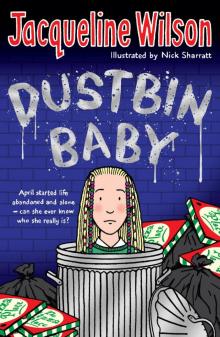 Dustbin Baby
Dustbin Baby Jacqueline Wilson's Happy Holidays
Jacqueline Wilson's Happy Holidays Katy
Katy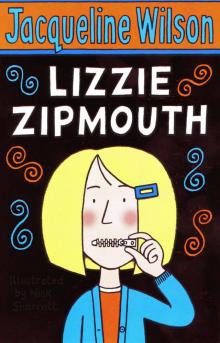 Lizzie Zipmouth
Lizzie Zipmouth Cliffhanger
Cliffhanger Vicky Angel
Vicky Angel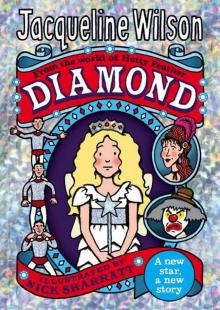 Diamond
Diamond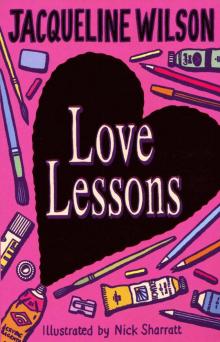 Love Lessons
Love Lessons My Mum Tracy Beaker
My Mum Tracy Beaker Lola Rose
Lola Rose Jacky Daydream
Jacky Daydream Green Glass Beads
Green Glass Beads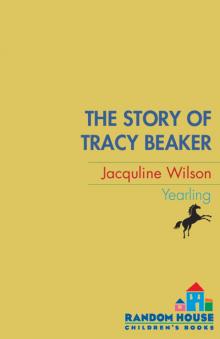 The Story of Tracy Beaker
The Story of Tracy Beaker Clean Break
Clean Break Longest Whale Song
Longest Whale Song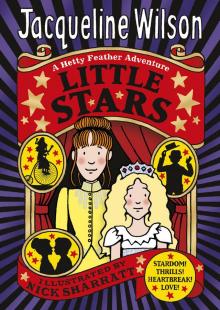 Little Stars
Little Stars Double Act
Double Act The Suitcase Kid
The Suitcase Kid Twin Tales
Twin Tales Girls in Tears
Girls in Tears The Dare Game
The Dare Game Diamond Girls
Diamond Girls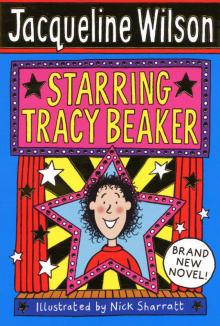 Starring Tracy Beaker
Starring Tracy Beaker My Sister Jodie
My Sister Jodie The Dinosaur's Packed Lunch
The Dinosaur's Packed Lunch Candyfloss
Candyfloss Opal Plumstead
Opal Plumstead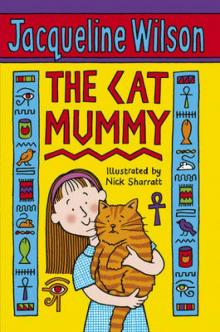 The Cat Mummy
The Cat Mummy Werepuppy and the Werepuppy on Holiday
Werepuppy and the Werepuppy on Holiday Hetty Feather
Hetty Feather Butterfly Beach
Butterfly Beach Midnight
Midnight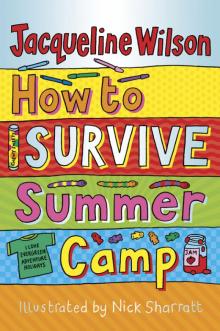 How To Survive Summer Camp (ePub)
How To Survive Summer Camp (ePub) Cookie
Cookie The Worst Thing About My Sister
The Worst Thing About My Sister Bad Girls
Bad Girls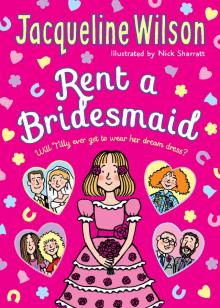 Rent a Bridesmaid
Rent a Bridesmaid Girls in Love
Girls in Love The Mum-Minder
The Mum-Minder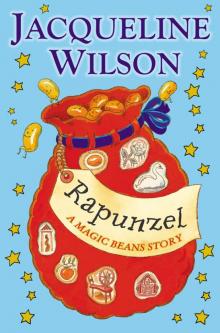 Rapunzel
Rapunzel Lottie Project
Lottie Project Best Friends
Best Friends Video Rose and Mark Spark
Video Rose and Mark Spark Glubbslyme
Glubbslyme Girls Out Late
Girls Out Late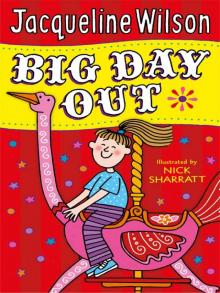 Big Day Out
Big Day Out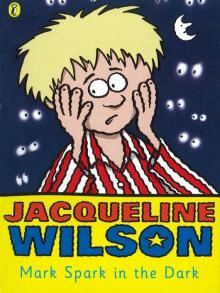 Mark Spark in the Dark
Mark Spark in the Dark Buried Alive!
Buried Alive! Four Children and It
Four Children and It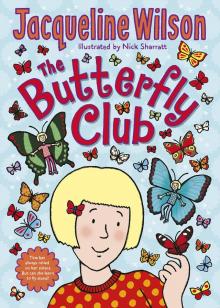 The Butterfly Club
The Butterfly Club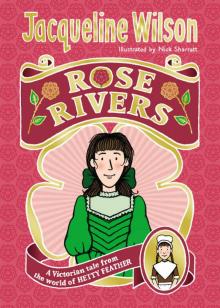 Rose Rivers
Rose Rivers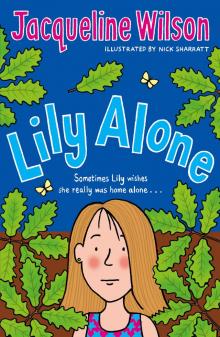 Lily Alone
Lily Alone Take a Good Look
Take a Good Look My Secret Diary
My Secret Diary Kiss
Kiss The Jacqueline Wilson Christmas Cracker
The Jacqueline Wilson Christmas Cracker The Worry Web Site
The Worry Web Site Emerald Star (Hetty Feather)
Emerald Star (Hetty Feather) The Bed and Breakfast Star
The Bed and Breakfast Star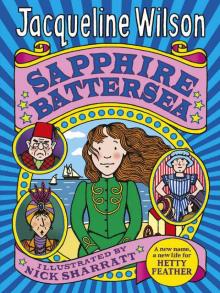 Sapphire Battersea
Sapphire Battersea Cat Mummy
Cat Mummy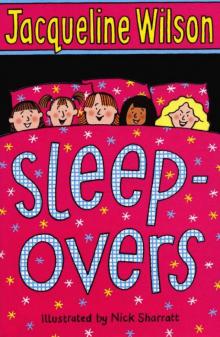 Sleepovers
Sleepovers Dare Game
Dare Game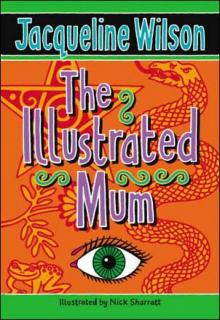 The Illustrated Mum
The Illustrated Mum Secrets
Secrets